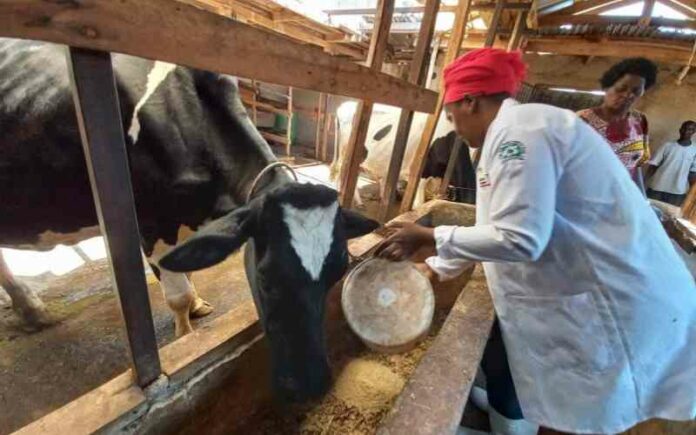Many young peoplegraduate from institutions of higher learning full of hopes of getting well paying jobs. But hope is sometimes a dangerous thing that might end up with disillusionment.
This is the harsh reality that many young graduates often face. They tarmack for days without any success. Many get crashed by the harsh realities of a scarce job market.
But a few find alternatives that they turn into money making ventures. One of these is Edna Kaveza who turned to dairy farming after tarmacking in search of jobs in vain.
She set up a profitable dairy farm that has been giving her as much as Sh. 5,000 daily on peak seasons. Here is her story it was written by Brian Kisanji and published by the Smart Harvest:
Edna Kaveza, a graduate of Kenyatta University, went into modern dairy farming in a county where many farmers focus on small scale tea and maize plantation.
She has set up an admirable dairy processing unit that supplies milk and dairy products in the area.
Hers is the typical narrative that every young graduate can relate to. After she graduated almost 10 years ago with a Bachelor of Arts degree in Psychology, she tarmacked in Nairobi for years in vain. To manage her living expenses, she would put up with relatives.
“I went from office to office dropping my CV hoping to get a call. But nothing came through. I only received regrets. I tried consultancy but it was fruitless because I did not have any wealth of experience that attracts deals,” says Kaveza.
Nicholas Kirimi: I make Sh. 20,000 profit from dairy farming per month
When reality hit, she relocated to her rural home in Emanda village in Vihiga to try her hand at dairy farming. Dairy farming wasn’t a new concept to her as her mother Margaret Ahona was doing it on a small scale.
“My mother has always been into dairy farming but on a low scale. She is the one who encouraged me to try it out instead of suffering alone in the city,” says Kaveza.
To start off, Ms Kaveza teamed up with her mother in 2019 to start the dairy farming project. She bought four Friesian heifers at Sh. 100,000 per head. Getting the cash to buy the initial stock was a challenge and the mother had to chip into money that she had set aside for her children’s education.
“Mum was kind enough to chip into funds that she had saved up for my siblings’ education and we used that to buy four pedigree Friesian heifers,” says Kaveza.
After sinking almost all their money into the project, mother and daughter embarked on attending entrepreneurial and developmental dairy value chain training sessions from groups like Welthungerhilfe (WHH).
It was through benchmarking that she learned how to upgrade her venture into a full-time job.
“If it was not for my mother, I would be still in Nairobi or another city looking to get a job,” says Kaveza. Slowly, she was able to increase her stock. She now has six dairy cows with five sexed female calves and one bull.
Every morning at 4 am, you will find her milking the cows as opposed to just supervising the four other youths she has employed.
“At dawn, you will find me milking and cleaning the cow dung from the cows’ units. It’s a dirty job but the benefits are huge,” she says.
It is after milking that she starts feeding her herd of dry matter. Kavesa has a modern silage store which she says maintains the quality and cleanliness of the feeds. She makes her own silage from locally sourced Napier grass and maize plants. “Our ancestral land is small. So we lease farms in our neighbourhood and grow Napier grass and maize which are used to make the feeds,” says Kaveza.
To achieve maximum milk production, she has to maintain the Total Mixing Ratio (TMR) for the silage and other feeds or supplements like dairy meal that she outsources. “One crucial thing in dairy farming is maintaining the right TMR because once you miss it you lose on milk production,” says Kaveza. Her cows are housed in well-constructed structures that are maintained maximum cleanliness. Cleanliness is paramount to avoid animal diseases associated with poor hygiene like mastitis.
“Cows hate stress and dirty environment. It triggers stress hormones and this in turn affects milk production levels,” says Kaveza. To boost yields, she has embraced technology and keeps up-to-date records of the animals using mobile applications.
“I can monitor the lactation and feeding cycle thanks to a mobile application that checks the feeding and milk programme of every cow,” says Kaveza. Currently, Kaveza has six dairy cows that produce a total of 100 litres of milk daily.
At a high peak, the production can go up to 150 litres. Currently, milk production is low as some of the cows are drying up. She sells a litre at Sh. 50 translating to close to Sh. 5,000 daily.
“At the moment, only three cows are at the peak of milking. I milk close to 100 litres of milk a day and sell the milk at Sh. 50 a litre,” says Kaveza. She supplies milk to local markets but also delivers a significant amount at Vihiga Dairy Cooperative Society.
Her dairy farm is among the top suppliers of milk to the newly revamped Vihiga Dairy Cooperative Society. Owing to her success, her farm is now a demonstration centre where other young practicing and potential dairy farmers come to benchmark.
Her future plan is to increase the number of dairy cows to 100 to meet the demand for milk in Vihiga. “My plan is this, if we continue with breeding at the farm with each cow getting superior pedigree semen through Artificial Insemination, we can get more animals and also increase our milk production,” says Kaveza.









